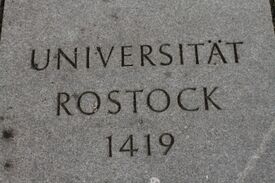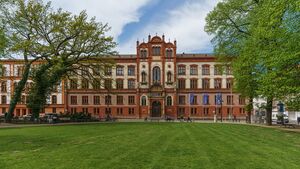University of Rostock
(University) | |
|---|---|
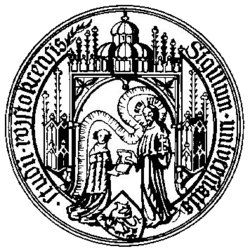 | |
| Formation | 1419 |
| Headquarters | Rostock |
| Nowadays trying to focus on high technology | |
The University of Rostock (Universität Rostock) is a public university located in Rostock, Mecklenburg-Vorpommern, Germany. Founded in 1419, it is the third-oldest university in Germany. It is the oldest and largest university in continental northern Europe and the Baltic Sea area, and 8th oldest in Central Europe.[1] It was the 5th university established in the Holy Roman Empire.
The university has been associated with five Nobel laureates. Famous alumni include Nobel laureates: Albrecht Kossel, Karl von Frisch, and Otto Stern; theoretical physicists: Pascual Jordan and Walter H. Schottky. It is a member of the European University Association. The language of instruction is usually German and English for some postgraduate studies.
In the vicinity of the university, institutes, start-ups and established companies have created clusters of business and research in the areas of high technology. Especially in the sectors of biotechnology, medicine and life sciences (e.g. BioCon Valley and DZNE), nanotechnology, light research and photonics, agricultural and environmental sciences, in maritime research (IOW) as well as in research into areas of data processing and the information society ( IGD), important companies have settled here. Demographic research in the area around the university is also world-class, especially with the responsible Max Planck Institute.
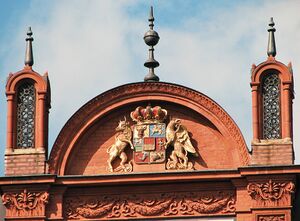
Contents
History
It was founded in 1419 by confirmation of Pope Martin V and thus is one of the oldest universities in Northern Europe.
In (Germany), there are only five universities that were founded before, while only Heidelberg and Leipzig operated continuously since then: Heidelberg (1386), Cologne (1388), Erfurt (1392/1994), Würzburg (1402/1582) and Leipzig (1409). That makes Rostock University the third oldest German university in continuous operation.
Throughout the 15th century, the University of Rostock had about 400 to 500 students each year, a large number at that time. Rostock was among the largest universities in (Germany) at the time and many of its students also came from the Low Countries, Scandinavia or other states bordering the Baltic Sea.
In the course of political struggles and pressure from the church, the university moved to Greifswald in 1437 and remained there until 1443. From 1487 to 1488 teaching took place in Lübeck.
A few years later the city of Rostock, its university also became Protestant in 1542. Humanism and Lutheranism were defining characteristics of the university. After the Thirty Years' War (1618–1648), the University of Rostock played only a regional role. When the "ownership" of the university moved from the city to the state (Grand Duchy of Mecklenburg-Schwerin) in 1827, however, things changed for the better. The end of the 19th century saw generous building activity in Rostock's alma mater and the university soon regained its old reputation amongst German universities.
1919–1945
On the occasion of the 500th anniversary of the university, Albert Einstein and Max Planck received honorary doctorates on 12 November 1919. This made the University of Rostock the world's first institute of higher learning to award this honour to Einstein. The doctorate was not revoked during the Nazi rule in Germany (1933–1945), despite such orders by the Nazis. The reason for this remains unknown. Psychologist David Katz and professor of dentistry and dean of the medical faculty Template:Interlanguage link multi lost their posts in 1933 among others.
1945–1989
The end of the Second World War in 1945 brought many changes. The university, now finding itself in the Soviet Zone of Germany (the later German Democratic Republic), was re-opened on 24 February 1946. The Faculty of Law was closed in 1951, a Faculty of Agriculture was introduced in 1950 and in 1951 saw the opening of a Department of Shipbuilding (renamed Faculty of Technology in 1963). The University of Rostock was the first traditional university in Germany to open a technical faculty. In 1952, the Faculty of Aviation was opened, but eventually relocated to Dresden.
In 1976 the university was renamed Wilhelm-Pieck-Universität after Wilhelm Pieck, the first president of the German Democratic Republic. The renaming was annulled after the German reunification.
1989–present
The regional economy has improved as over 800 companies launched from the university since 1991. External funding for research increased between 2005 and 2010 by 83% and currently is above 47 million Euros per year. Over 500 million Euros has been invested in the university infrastructure since 1991, which will reach 750 million Euros by 2015. The number of young people from the West Germany and international students who choose University of Rostock as a study location, are increasing every year. International Students from 99 different countries have been studied at University of Rostock. In 2007, the University of Rostock gathered its research capacities into three profile lines: Life, Light & Matter (LLM), Maritime Systems, and Aging of Individuals and Society. In 2010 a fourth was added, called Knowledge-Culture-Transformation. Life, Light & Matter develops new concepts for future technologies based on atomic and molecular processes in connection with laser optics and life sciences. Maritime Systems unites oceanographers, engineers, humanities scholars, agricultural and social scientists, economists and lawyers. Aging of Individuals and Society has as its target a self-determined lifestyle in old age. Knowledge-Culture-Transformation deals with media and the representation of knowledge, transformation of knowledge, knowledge and interculturalism as well as knowledge and power.
Notable alumni and faculty
In nearly six centuries numerous notable students and professors have had ties with the university, for instance:
- Template:Ill (1409–1469), from Geismar, Hesse, astronomer, mathematician, pastor, taught at Rostock and Thorn, wrote Template:Ill
- Hans Teiste, 29th Bishop of Bergen, Norway (Magister in 1468)
- Hoskuld Hoskuldsson, 28th and last Roman Catholic Bishop of Stavanger (Magister in 1493)
- Mogens Lauritssøn, 27th and last Roman Catholic Bishop of Hamar (Magister in 1494)
- Ulrich von Hutten (1488–1523), humanist, wrote his first important opus in Rostock in 1509
- Olaus Magnus (1490–1557), Swedish humanist, ethnologist and cartographer
- Olav Engelbrektsson, 28th and last Roman Catholic Archbishop of Nidaros (Baccalaureus in 1505, Magister in 1507)
- Levinus Battus (1545–1591), physician (MA in 1559)
- David Chyträus (1530–1600), theologian, education policy maker and historian, Professor of Theology since 1561
- Tycho Brahe (1546–1601), Danish astronomer (studied in 1566)
- Axel Oxenstierna (1583–1654), Swedish chancellor, strategist and statesman (studied, 1599–1601)
- Joachim Jungius (1587–1657), mathematician, physicist and philosopher, Professor of Mathematics in Rostock from 1624 to 1628
- Template:Interlanguage link multi (1669–1725), Superintendent of Lueneburg, poet who wrote baroque poems and song texts, studied theology until 1694
- Oluf Gerhard Tychsen (1734–1815), Orientalist and Hebrew scholar; taught at the University of Rostock from 1778
- Samuel Gottlieb Vogel (1750–1837), physician, Professor of Medicine in Rostock since 1789
- Template:Interlanguage link multi (1751–1829), economist and agricultural economist
- Johann Heinrich Friedrich Link (1767–1850), natural scientist, Professor of Chemistry, Zoology and Phytology from 1792 to 1811
- Johann Heinrich von Thünen (1783–1850), economist and social reformer (Dr. h.c. in 1830)
- Template:Interlanguage link multi (1784–1841), jurist, professor from 1816
- Template:Interlanguage link multi (1789–1875), jurist, vice-chancellor of the University of Rostock, 1836 to 1870
- Fritz Reuter (1810–1874), novelist, studied law at the University of Rostock from 1831, received an honorary doctorate in 1863
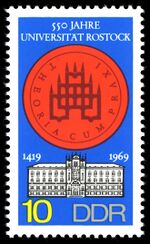
- Template:Ill (1814–1870), poet, studied law at the University of Rostock from 1834 to 1838
- Carl Friedrich Wilhelm Brockmann, philosopher (PhD in 1848)
- Heinrich Schliemann (1822–1890), archaeologist (PhD in 1869)
- Template:Ill (1831–1893), actuary (PhD in 1858)
- Rudolf Berlin (1833–1897), physician, Professor of Ophthalmology, dean since 1895 and rector since 1897
- Hermann Roesler (1833–1897), physician, Professor of Ophthalmology, dean and rector
- Rudolph Sohm (1841–1917), lawyer and Church historian
- Albrecht Kossel (1853–1927), medical scientist and Nobel Prize laureate (PhD 1878)
- Eugen Geinitz (1854–1925), geologist and mineralogist, Professor of Mineralogy and Geology, Director of the Mineralogical-Geological Institute
- Isaac Rülf, philosopher, humanitarian organizer, author (PhD in 1865)
- Rudolf Steiner (1861–1925), Philosopher (Dr. phil. in 1891)
- Emil Mattiesen (1875–1939), composer, pianist and philosopher, Professor of church music from 1929
- Template:Ill (1878–1959), jurist and expert on Scandinavian studies, translator of the Edda songs, Professor of Public Law from 1920 to 1922
- Gustav Mie (1868–1957), physicist, studied physics at the University of Rostock from 1886 to 1889
- Moritz Schlick, (1882–1936), philosopher, habilitation in 1911, lecturer from 1911 to 1921, later initiator of the Viennese Circle; at the Institute of Philosophy of the Faculty of Humanities
- Template:Interlanguage link multi (1883–1960), physician, co-founder of Hematology, Head of the Rostock University Hospital
- David Katz (1884–1953), psychologist, from 1919 to 1933 associate professor, later professor, conferred to emerited status by the National Socialists due to his Jewish origins.
- Template:Interlanguage link multi (1885–1933), ab 1920 erst from 1920 on international significant Associate Professor, later Professor of Dentistry, committed suicide after he was dismissed because of his Jewish origins; commemorative plaque in the foyer of the main university building
- Walter H. Schottky (1886–1976), physicist, Professor of theoretical Physics from 1923 to 1927
- Karl von Frisch (1886–1980), ethologist and Nobel laureate in medicine (zoology professor, 1921–1923)
- Otto Stern (1888–1969), Nobel laureate in physics, (experimental physics professor, 1921–1923)
- Albert Einstein, Nobel laureate in physics (Dr. h.c. in 1919[2])
- Max Planck, Nobel laureate in physics (Dr. h.c. in 1919)
- Template:Interlanguage link multi (1900–1985), classical philologist, Professor of Greek Studies from 1933 to 1935
- Walter Hallstein (1901–1982), politician and jurist, first President of the European Commission, State Secretary in the German Chancellors Office and the Foreign Office (law professor 1930–1941)
- Pascual Jordan (1902–1980), physicist, co-founder of Quantum mechanics, later professor of Physics from 1929 to 1944
- Eugen Gerstenmaier (1906–1986), theologian and politician, member of the Kreisauer Circle, later President of the German Bundestag, Promotion at the Faculty of Theology in 1935
- Template:Interlanguage link multi (1906–1971), statistician, studied politology, doctorate degree as Dr. rer. pol. in 1940
- Gonzalo Rojas (1917–2011), Chilean poet (professor, 1973–1975)
- Arno Esch (1928–1951), student and liberal politician, active member of the Liberal Democratic Party, condemned to death as declared opponent of communism; commemorative plaque in the foyer of the main university building
- Joachim Gauck, 11th President of Germany, studied theology in Rostock until 1965, honorary doctor in 1999
- Walter Kempowski (1929–2007), writer, honorary professor of Contemporary German Literature and Cultural History since 2003
- Hans Apel (1932–2011), politician, former Federal Minister of Finance, later Minister of Defense, Honorary professor of Financial Policy at the Faculty of Economic and Social Sciences since 1993
- Uwe Johnson (1934–1984), author, studied German language and literature at the University of Rostock from 1952 to 1956
- Hans-Joachim Schulze (born 1934), German Bach scholar
- Bettina Meyer, Antarctic researcher in marine biology, received her doctorate from the University of Rostock in 1996
- Viviana Simon, Professor of Microbiology, received her doctorate in 1997.
Alumni on Wikispooks
| Person | Born | Died | Nationality | Summary | Description |
|---|---|---|---|---|---|
| Joachim Gauck | 24 January 1940 | Politician Clergy | President of Germany 2012-2017 | ||
| Otto Kersten | 1928 | 1982 | Germany | Leader of the Labour Party | General Secretary of the International Confederation of Free Trade Unions who attended two Bilderberg meetings in the 1970s. |
References
- ↑ Prague (1348), Kraków (1364), Vienna (1365), Pécs (1367), Heidelberg (1386), Cologne (1388), Leipzig (1409), Rostock (1419).
- ↑ http://www.einstein-website.de/z_information/honours.html#rostock%7Ctitle=Albert Einstein – Honours, prizes and awards|first=Hans-Josef|last=Kuepper
